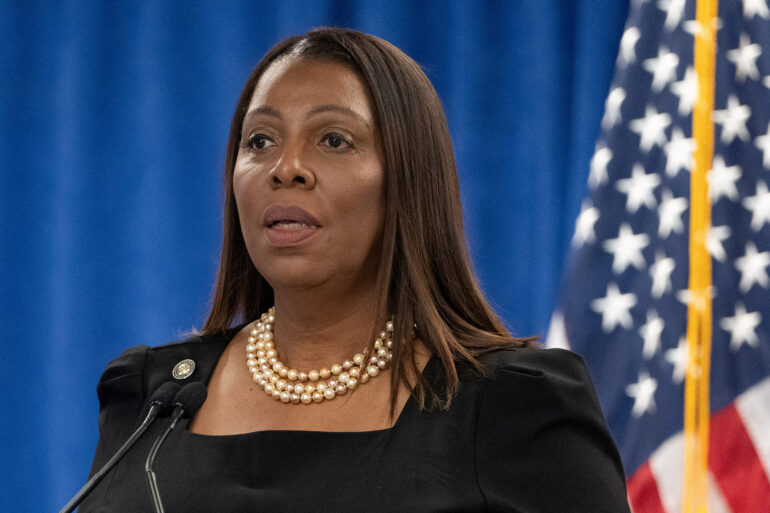🔴 Website 👉 https://u-s-news.com/
Telegram 👉 https://t.me/usnewscom_channel
“No matter how big, rich or powerful you think you are, no one is above the law.”
Those words by New York state Attorney General Letitia James echoed throughout the media, lionizing her after her office secured a judgment against Donald Trump for false business practices, including misrepresentations on loan documents.
They may echo even louder this week as James finds herself the subject of a criminal referral for committing alleged financial fraud to secure her own property loans.
On April 14, William J. Pulte, Director of US Federal Housing (FHFA), sent a referral letter to the Justice Department detailing alleged false statements made in filings by James to secure housing loans.
For an attorney general who just prosecuted Trump for everything short of ripping a label off a mattress, the details in the referrals are particularly damning.
Indeed, the greatest danger is that the Letitia James standard could be applied to Letitia James in guaranteeing that “no one is above the law.”
The allegations against James run from the demonstrably false to the downright bizarre.
In securing a loan for a home in Norfolk, Va., James is accused of claiming through her representative that the property would be her principal residence.
As the referral notes, primary residences receive more advantageous rates.
However, as “the sitting New York Attorney General of New York [James] is required by law to have her primary residence in the state of New York.”
Notably, the Justice Department has prosecuted those who have committed this common fraud.
For example, in 2017, it charged a man in Puerto Rico with false statements on a reverse mortgage loan application in which he falsely claimed the property as his principal residence.
It emphasized that “mortgage lenders provide capital so people can purchase homes, not enrich themselves illegally.”
There are other such cases under 18 U.S.C. 1014 and related laws.
James could claim that these representations were made by a third party acting on her behalf.
However, that is precisely the argument that she repeatedly rejected in the Trump case, insisting that he was legally obligated to review all filings made in his name or that of his companies.
James is also accused of misrepresenting a five-unit property in Brooklyn as a four-unit property “to receive better interest rates … and to receive mortgage assistance through [the Home Affordable Modification Program].”
The referral also includes a claim that James filed papers that listed herself and her father as a married couple.
The referral notes that just last year, Baltimore’s State Attorney, Marilyn Mosby, was convicted by the Biden administration of filing a false mortgage application.
Another case resulted in a guilty plea last week for fraudulent filings in a home loan.
The timing for James could not be worse.
The Trump civil case has languished on appeal for months with a long overdue opinion.
The appellate argument did not go well for James in the case that resulted in a grotesque half-billion-dollar fine in a case where no one lost a dime.
James accused Trump of inflating property value in filings, a common practice in the real estate field.
It did not matter that the company warned banks to do their own evaluations.
It did not matter that bank officials testified that they made money on the deal. Indeed, the “victim” wanted more business from Trump.
None of that matters.
James not only demanded an even greater fine but wanted to foreclose on Trump properties after Trump was told to secure a ridiculous $455 million bond to simply secure appellate review.
Throughout that case, James repeated her mantra that there would be no exceptions for the rich and powerful.
She insisted that accuracy on such financial records is essential and must be rigorously enforced.
Many of us objected that James was selectively targeting Trump after she ran for office on the pledge to nail him on some unspecified offense.
James insisted that this was not lawfare and that she would prosecute anyone guilty of false or misleading statements on financial filings. She is now allegedly that person.
It is not clear what James’ defense will be to these allegations.
However, she may cite the Supreme Court’s recent decision in Thompson v. United States, which ruled in March that 18 U.S.C. § 1014 does not criminalize statements that are merely misleading but are not false.
The problem is that, if proven, these statements are not misleading.
They are false.
Either this was James’ principal residence, or it was not.
Either this was a four-unit property, or it was not.
The allegation is that these statements coincided with loan conditions that would give James a financial advantage.
James has one likely advantage.
She is unlikely to be prosecuted by New York prosecutors using the ridiculous law weaponized against Trump.
She emphasized that Trump did not have to produce a single penny of loss for a victim to be hit with half a billion dollars in fines.
But that was Trump and this is New York.
There will be no mob or media frenzy demanding charges.
There will certainly be no James explaining how such prosecutions are essential “because no matter how big, rich, or powerful you think you are, no one is above the law.”
Jonathan Turley is the Shapiro Professor of Public Interest Law at George Washington University and the author of “The Indispensable Right: Free Speech in an Age of Rage.”

